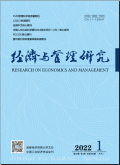经济与管理研究2024,Vol.45Issue(4):38-55,18.DOI:10.13502/j.cnki.issn1000-7636.2024.04.003
外出务工、家庭汇款对耕地撂荒的影响
Impact of Migrant Work and Family Remittances on Farmland Abandonment
摘要
Abstract
As the foundation of food production,farmland is closely related to food security,economic development,and social stability.Farmland abandonment is a final decision made by farmers after weighing the advantages and disadvantages,and migrant work is one of the influencing reasons.Therefore,it is of theoretical and practical significance to explore the relationship between migrant work and farmland abandonment,which can provide corresponding references for policy formulation to reduce farmland abandonment. Based on the theory of division of labor within families,this paper constructs a theoretical framework for the impact of migrant work on farmland abandonment and empirically analyzes the mechanism based on the data from the China Labor-force Dynamic Survey(CLDS)from 2016 to 2018.The results show that the loss effect brought by migrant work leads to the shortage of effective labor input for farmland production,thus resulting in farmland abandonment.At the same time,the income effect generated by migrant work through obtaining excessive labor returns in the non-agricultural sector does not have a positive effect on agricultural productive investment.Actually,it weakens the security function of farmland,which exacerbates farmland abandonment.Mechanism analysis shows that migrant work mainly affects farmland abandonment behavior by increasing family remittances.The possible reason is that in rural areas of China,migrant workers are the primary way for farmers to improve the effectiveness of family welfare.After farmers go out to work,family remittances are mainly used to subsidize household consumption expenditure,so as to improve family living standards.It also replaces the security function of farmland to a certain extent,leading to gradual separation from agricultural production and abandonment of farmland. The heterogeneity analysis shows that migrant work from professional families can reduce the occurrence of farmland abandonment to a certain extent.Furthermore,the impact of migrant work on farmland abandonment is more prominent for households with social security.Therefore,on the basis of ensuring that farmers have stable out of town jobs and social security for a long time,it should effectively guide land transfer and trusteeship and encourage various forms of moderate agricultural scale management to alleviate farmland abandonment. The possible marginal contributions of this paper are threefold.First,it takes the intra-household division of labor as the entry point.Second,it expands the research perspective of mainstream studies focusing on the loss effect and supplements the inadequacy of existing quantitative studies.Third,it explains the process of factor resource exchange and allocation included in migrant work from a dynamic perspective,which makes up for the limitation of previous studies that focus on static analysis only.关键词
外出务工/耕地撂荒/流失效应/收入效应/家庭汇款Key words
migrant work/farmland abandonment/loss effect/income effect/family remittance分类
管理科学引用本文复制引用
张禹书,张应良..外出务工、家庭汇款对耕地撂荒的影响[J].经济与管理研究,2024,45(4):38-55,18.基金项目
国家社会科学基金重点项目"新形势下提升中国粮食产业战略竞争力的重点方略与路径选择研究"(20AGL023) (20AGL023)
国家社会科学基金重点项目"实施藏粮于地、藏粮于技战略研究"(21AZD032) (21AZD032)
国家社会科学基金一般项目"大食物观视角下西部丘陵山区耕地撂荒治理效果评价与政策优化研究"(23BJY163) (23BJY163)

